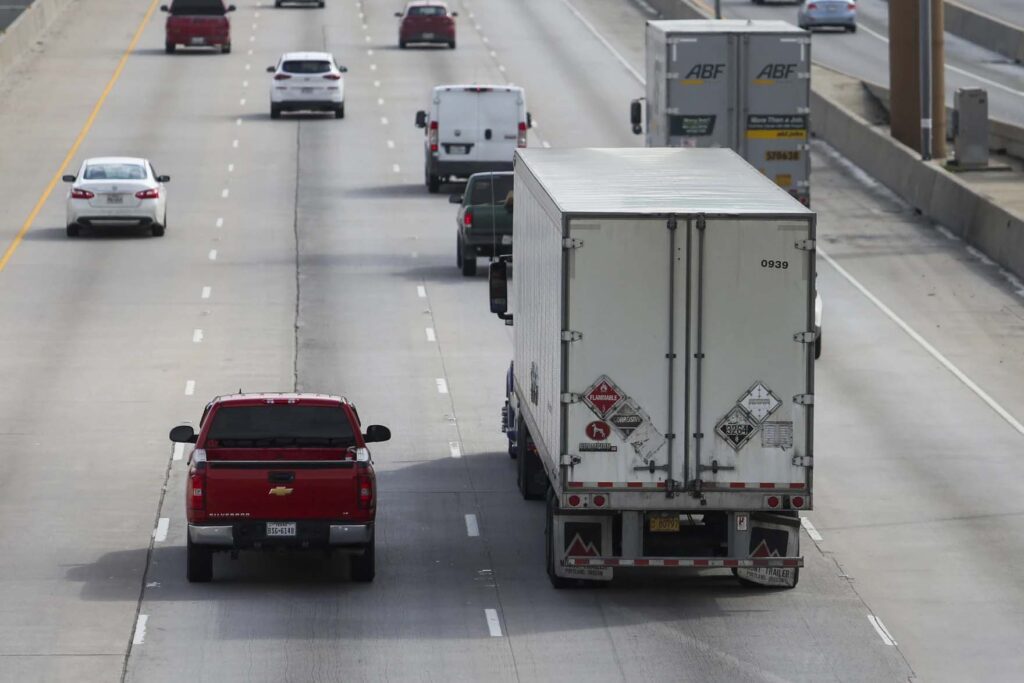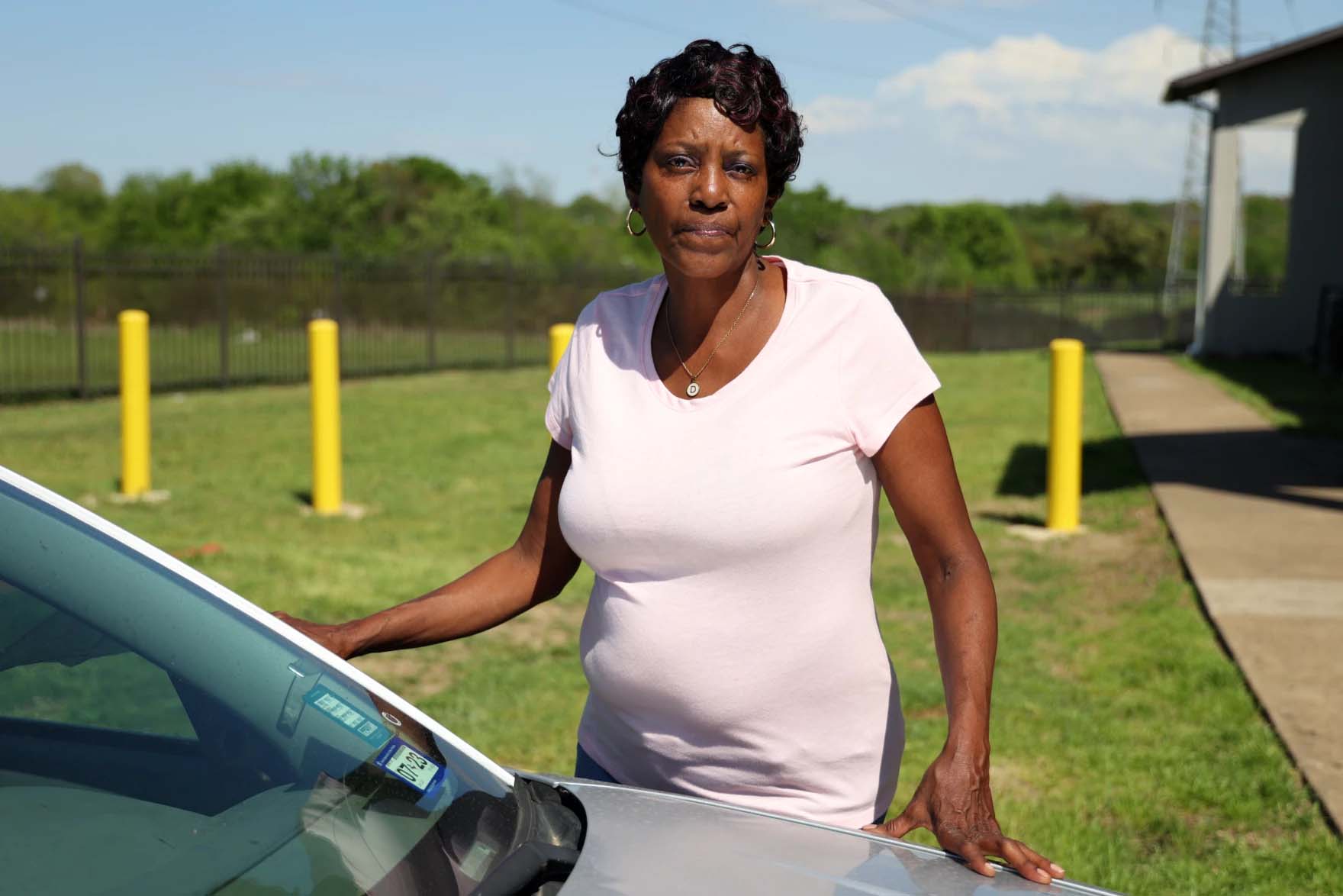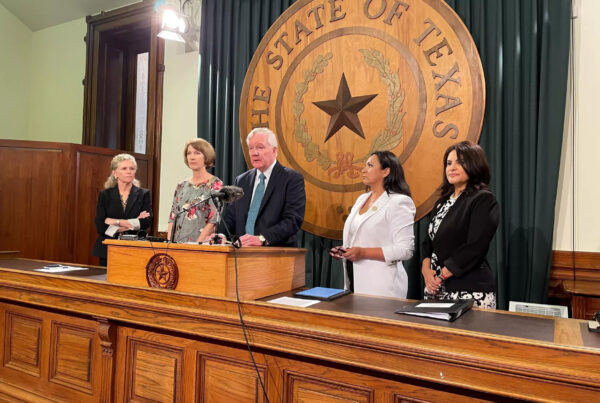From KERA News:
Donna Alexander spent almost two decades dogged by traffic tickets she couldn’t afford to pay.
She racked up about a dozen traffic tickets between 2002 and 2013 that she hadn’t paid. She was raising her kids, working a lot but not making much money.
Her license expired, but she’d kept driving, which resulted in more tickets, and the hole kept getting deeper.
“It was just very scary, but with all that being said, I kept driving. I had to go to work, I had three children I was raising,” Alexander said.
But a decade ago, she worked out a deal to do over 450 hours of community service to satisfy her tickets. It took her over a year, but Alexander completed the hours. She thought she was on track to finally get her license back.
When handed in her paperwork, she said the court clerk told her she owed over $300 in fees she had to pay before the looming deadline.
“There’s no working around [those fees]. You can’t set up no payment plan. You have to pay it, and when you don’t pay it, it just sits on your record. The tickets don’t go away, even though I did my community service,” Alexander said.
The fees Alexander had to pay weren’t part of her punishment, at least not legally. When Alexander failed to satisfy each of the tickets, the judge had put a hold on her license, blocking her from renewing her license. Each of those holds carried a $30 administrative fee.
Nearly three decades ago, Texas lawmakers set up this Failure to Appear/Failure to Pay program to prod people into taking care of unpaid tickets by blocking their license renewal until the debts are satisfied. Most people call the program Omni or Omnibase, after Omnibase Services of Texas, the private company contracted by the state Department of Public Safety to keep track of the holds.
While the Omnibase program is designed as a mechanism to spur compliance, critics say it instead pushes low-income and marginalized Texans into a years-long cycle of deepening debt and intractable red tape.
“The thinking behind the program was that by putting these renewal holds on people’s licenses, it would incentivize them to pay or come to court,” said Mary Mergler, senior campaign strategist for the Fines and Fees Justice Center. “But in fact…what we’ve found is that it is not effective at getting people to pay their fines or come to court, but instead has created an actual barrier to them being able to comply with the court’s orders.”
‘Cycle of debt’
According to the Texas Department of Public Safety, there are more than 981,000 Texans with outstanding Omnibase holds, meaning they aren’t able to renew their drivers’ licenses until they satisfy their court debt. More than 610,000 of them have licenses that have expired that can’t be renewed until they satisfy their underlying tickets to get the holds lifted.
The department declined an interview request, as did the president of Omnibase Services of Texas, Shawn Tracy.
For Alexander, the Omnibase fees blocked her ability to clear her tickets, and she went home disappointed, frustrated, and no better off than she had been before spending hundreds of hours doing community service.
It would be almost another decade before she got the tickets dismissed.
“I definitely wanted my license. Now, don’t get me wrong, I wanted to be a legitimate licensed driver, but I could not afford those fees that they assessed against me. And so I just kind of put that on the way back burner,” Alexander said.
Research from the social justice groups Texas Appleseed and Texas Fair Defense Project in Dallas and Houston find Omnibase holds concentrated in the poorest zip codes in both cities, and among communities of color. Black and Latino drivers are significantly more likely than White drivers to have holds, they find — a trend attributed to both the increased policing of Black and Latino people and a severe, persistent racial wealth gap.
A recent University of Texas at San Antonio study of Omnibase holds from the city’s court data showed generally similar trends.
Sarah Mae Jennings runs Texas Fair Defense Project, which helps hundreds of people each year get out from under their Omnibase holds through a mostly pro-bono network of lawyers and legal clinics. The group helped Donna Alexander resolve her old tickets in 2021, years after she’d tried to do it herself. Jennings said Alexander was a typical case.
“What we see is folks come to us in a seemingly inescapable cycle of ticket debt,” Jennings said. “they are not scofflaws. They are not just avoiding the law to avoid the law. They are seeking out legal aid to help them navigate disentangling themselves from this huge snowball that they have gotten themselves into that feels insurmountable, trying to navigate on their own.”
Jennings said the cycle starts with a ticket they can’t afford to pay. While a $300 traffic ticket is an inconvenience for some Texans, Jennings points out that for millions of Texans, it becomes a choice between paying the light bill or paying the fine. Most Texans don’t know that they have alternatives to payment like community service, and many courts don’t do a great job of explaining it, she said.
So they skip court, or go and agree to a payment they can’t actually make. When they fail to show up or pay on time, a judge puts an Omnibase hold on their license. Once their license expires, things can really spiral, Jennings said. They can’t renew it because of the hold.
“Like it or not, Texans whose licenses are suspended still have to get to the same places. They still have to get to work, to school, to the grocery, to church, even to court. And so they’re going to continue to drive. And so then folks are getting tickets for driving while their license is invalid or driving without insurance or driving without valid registration”
The Dallas study shows that, although 87 different offenses lead to holds, just four “poverty-related offenses” — no license, invalid license, no insurance, and unregistered vehicle — accounted for 34% of all holds in the city.
That’s what happened to Donna Alexander. It’s not clear exactly when her license expired. But of the 13 tickets Texas Fair Defense Project helped her resolve, only three were moving violations like speeding. The rest stemmed from not having money to keep the car registered or insured, or from having an expired license.
“So it just kind of compounded itself, you know, and it did get worrisome. But, you know, I just kind of put it in the back of my mind and just prayed and just did what I had to do,” Alexander said.
That stress and anxiety takes a toll, she said.
Expired or suspended licenses also make it harder for people to find a job, to keep their job, or to rent an apartment. A recent study puts the financial impact of licenses lost to the Omnibase program at over $5 billion per year in lost earnings, or $12,700 per person per year – a “conservative” estimate, the author wrote, “the true financial impact is likely higher.”
A useful tool?
In 2021, Texas Appleseed and Texas Fair Defense Project compared how well courts do at collecting revenue from traffic tickets in jurisdictions that issue Omnibase holds, and those that don’t. They found that the courts not using the program actually had a slightly higher rate of collecting ticket revenues than those that didn’t.
Nonetheless, the program remains widely used. According to the Texas Department of Public Safety, more than 1,000 jurisdictions have active memoranda of understanding to use the Omnibase program.
“There may be research that says it doesn’t work, but I’m here to tell you that it does. I probably get five people a week that have an Omni hold that contact my court to deal with citations that they did not deal with initially,” said J. R. Woolley, a Waller County justice of the peace, at a hearing in the Texas Legislature this year.
Woolley, who heads the Justice of the Peace and Constable Association of Texas, told the lawmakers the program was one of few tools courts have to address unmet ticket judgments.
Bipartisan legislation to repeal the program failed to gain traction this year, despite support from a broad coalition of that included the ACLU, Americans for Prosperity, the Texas Baptists Life Commission, and Goodwill.
Opponents were primarily police and sheriff associations, and representatives of courts that use the program. In testimony, Woolley and other judges defended the program as useful, less onerous than issuing an arrest warrant for unpaid tickets, and a matter of public safety.
“I don’t want to get rid of a program without some other program to get people in court,” Woolley said.
Lawmakers have moved to moderate the program slightly. In 2011, lawmakers required courts to take action to lift the holds after a person had satisfied their ticket and caught up with their fees. Six years later, they allowed judges to waive the administrative fee for people who are indigent or if the underlying case was dismissed for lack of evidence. In 2020, the fee was reduced to $10 per hold.
Although efforts in the Texas Legislature to repeal the program failed in the recently ended legislative session, campaigns to convince local governments to drop the program have been more successful.
A campaign is underway to convince San Antonio to cancel its contract with Omnibase now. It would join Harris County, Austin and Dallas, which ended their participation in recent years.
The effort came after a campaign by the Texas Organizing Project, Texas Appleseed, Texas Fair Defense Project and CitySquare, and as part of the city’s participation in a national effort to assess the impact of the fines and fees it levies.
Dallas Office of Equity and Inclusion Director Lindsey Wilson said the decision to drop the program came out of an examination of the city’s own court data and some tough questions: “Do we see disparities not only in the amount of fines and fees, but in who’s being fined and fee’d?,” Wilson said. “I think the other question is: Is this getting the outcome that we’re looking for?”
The city found Black and Latino residents in lower-income neighborhoods face a disproportionate burden from fines and fees, including Omnibase, and that Omnibase and other similar efforts weren’t very effective as revenue-collection tools, she said.
Although no new Omnibase holds are being issued by the municipal court, Dallas did not lift holds already put in place, unlike Harris County. City staff said at the time that it didn’t have the authority to do so, leaving in place more than 200,000 active holds ordered by the city court, according to DPS records. Dallas County justice of the peace courts remain heavy users of the program.

When licenses expire and people cannot renew them due to Omnibase holds, advocates say they often need to keep driving to get to work, buy groceries, or pick up kids from school. “Then, they’re putting themselves at risk of incurring additional tickets, additional warrants, additional fines and fees on this cycle of ticket debt,” said Sarah Mae Jennings from Texas Fair Defense Project.
Yfat Yossifor / KERA
Alternatives
Mary Mergler from the Fines and Fees Justice Center said states and localities are increasingly moving away from taking away people’s licenses because of court debt.
“There’s some pretty basic commonsense reforms that can be implemented that would actually improve compliance without all of the harms associated with driver’s license renewal holds and warrants and those sorts of enforcement mechanisms,” Mergler said.
Automated text message reminders of court dates increase attendance, she said. Targeted court-in-the-community events spur people to clear old tickets. Just explaining the availability of options like payment plans, community service or other alternatives increase ticket compliance. Fundamentally, Mergler said, courts need to do a better job of matching the fine to the defendant’s ability to pay.
“There’s evidence from other jurisdictions that shows lower fine amounts lead to greater compliance. I mean, it’s almost so basic that it sounds silly saying it because it seems so obvious, but it’s true: If you want people to comply, you have to order them to do something they are able to do,” Mergler said.
Texas lawmakers have moved in recent years to improve options for low-income people to get alternatives to unaffordable fines, but Mergler said they’re underutilized. Judges have also been empowered to waive Omnibase fines since 2017.
Unraveling the holds is a major challenge. People in the program often have a host of arrest warrants, additional court fees unrelated to Omnibase but stemming from their debt. They may have holds or other blocks on their license from multiple courts.
For Donna Alexander, even after a lawyer helped her clear her old tickets, she still hasn’t gotten her license back, blocked by a fee from the Texas DPS fee and other administrative consequences of going so long without a valid license. She said she’s going to work again with Texas Fair Defense Project to try to, finally, get her driver’s license again.

















